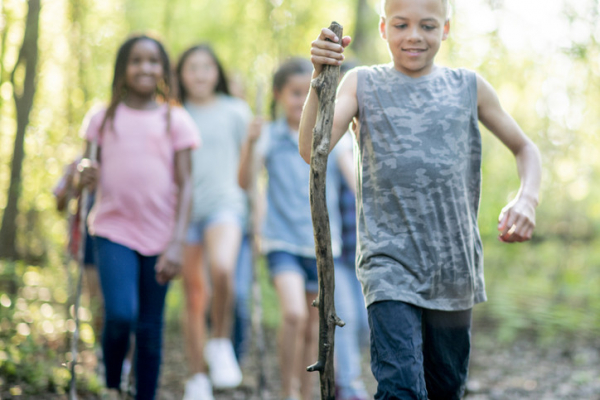
It’s time to make summer plans, and for many families those plans include summer camp. After the past couple of years, the idea of getting out of the house, being active, and seeing other children sounds very appealing.
While COVID-19 is still with us, vaccines and the fact that so many people have gotten sick and developed some natural immunity has made activities like summer camp less treacherous. Unfortunately, this doesn’t mean that families don’t need to think about COVID-19 as they make their plans, because they still do.
What to do before signing up for summer camp this year
Before even thinking about camp, take into account your family’s particular risk factors. If children are 5 or older and haven’t been vaccinated, now is the time to get the vaccine. If you have any questions or concerns about the vaccine, please talk to your doctor. While you are at it, make sure that children are up to date on routine childhood vaccinations. Many children have gotten behind because of the pandemic.
Talk to your doctor about the pros and cons of camp if your child
- isn’t or can’t be vaccinated, since it’s important to think about factors that might make getting COVID riskier.
- has health problems like asthma or congenital heart disease that put them at higher risk of complications of COVID-19.
- has a weakened immune system for any reason. Whether or not your child is vaccinated, it’s always important to check in with their doctor before sending them to camp, or any group activity.
Questions to ask any camp you’re considering
These days, most communities have dropped mask mandates. While it’s certainly nice to not have to wear one — and to see people’s faces — masks do make a difference when it comes to preventing the spread of infection. COVID-19 is still causing illness and is likely to be with us beyond this summer. Before signing up for camp there are things parents should think about — and questions they should ask.
Where is the camp, and where are the campers and staff from? A local day camp with children and staff mostly from a town with low numbers of COVID cases is going to be lower-risk than one in a community with higher numbers, or one that draws from many different communities, including some with higher numbers. The Centers for Disease Control and Prevention has a database of case numbers by county.
What is the vaccination status of the staff and campers? Ideally, all eligible staff and campers should be vaccinated — with not just their primary series, but any booster doses they are eligible to receive.
How is the camp screening for symptoms or exposures, and what guidelines do they have in place? This is most important when there are unvaccinated staff or campers, or in areas of higher case counts. The camp should have a plan for screening campers and staff for symptoms, with appropriate plans for staying home, testing, and quarantine based on the results of those screenings. Find out how exposures outside of camp will be handled for campers and staff. Sleepaway camps should have designated quarantine space, and access to testing. Ask about their testing requirements, as well.
Are activities mostly indoors or mostly outdoors? The more outdoor activities, the better. Indoor activities are safest in well-ventilated spaces.
What is the policy on wearing masks? Wearing a mask for 10 days after testing positive for COVID or being in close contact with someone who has it is essential to help others stay healthy. (Also follow recommendations for quarantine or isolation described in this tool from the CDC.) Masks may also be a good idea for indoor situations where people are close together — and some staff and campers might simply feel more comfortable wearing a mask. The camp should have a culture that allows those who choose to wear masks to feel comfortable doing so.
What is the plan for shared equipment and surfaces? One is far more likely to catch an infection from a person than a surface, but it’s important that anything that multiple people touch be wiped down regularly.
What is the plan for hand washing? Regular hand washing with soap and water or hand sanitizer is important to limit the spread of germs, including the virus that causes COVID-19. Parents should ask how often campers will be washing their hands, and about the availability of hand sanitizer.
What is the plan for meals? Eating together increases the risk of transmission of COVID-19. The risk is lower if people eat outdoors or have some space to spread out — and if they bring their own food rather than sharing.
As much as we may all feel done with COVID-19, the reality is that COVID-19 isn’t done with us. Children need the experiences camp can bring, especially after their lives have been so disrupted — and with just a few precautions, they can have fun and be safe too.
Follow me on Twitter @drClaire
